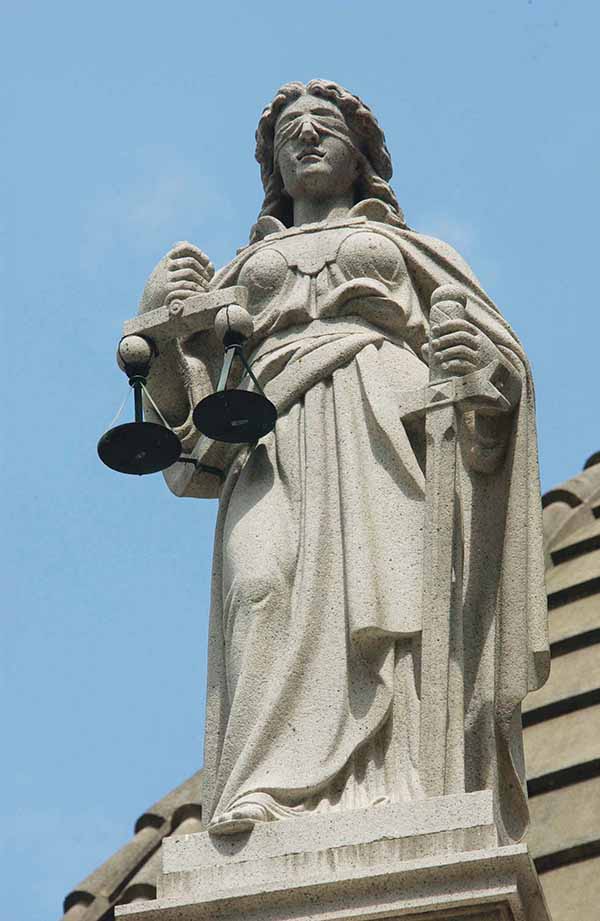Today, the U.S. Supreme Court has ruled in favor of Jack Phillips, the Colorado baker who refused to create a wedding cake for a same-sex marriage ceremony.[1] This is a win for religious freedom says Franklin Graham! But not everyone shares this view. Some feel this is a swipe at the LGBT movement. Neither of the above are the focus of today’s blog. What is of interest for today is the integrity and impartiality of the Supreme Court’s decisions and the judiciary as a whole. What does this ruling teach us about the U.S. justice system?
But before we delve into this case and the ruling, first let us consider the greater context within which the judiciary sits. The judiciary (also known as the judicial system or court system) is the system of courts that interprets and applies the law in the name of the state.
SEPARATION OF POWERS
One of the most widely used models of Government argues for a separation of powers. Separation of powers refers to “the division of the legislative, executive, and judicial functions of government among separate and independent bodies. Such a separation, it has been argued, limits the possibility of arbitrary excesses by government, since the sanction of all three branches is required for the making, executing, and administering of laws”.[2]
This idea that government is made up of three arms, branches is not new. It can be traced as far back as to biblical times.
Isaiah 33:22 For the LORD is our judge (JUDICIARY), the LORD is our lawgiver (LEGISLATUE), the LORD is our king (EXECUTIVE); it is he who will save us.
In kingdoms, all three arms / branches were concentrated in the King. In democracies, the three arms of government are decentralized so none should have excessive power and there should be a system of checking if a correct balance is maintained between the three branches so as to avoid abuse of power to protect the rights and liberties of the citizens.
CHECKS AND BALANCES
Checks and balances is a “principle of government under which separate branches are empowered to prevent actions by other branches and are induced to share power. The framers of the U.S. Constitution, who were influenced by Montesquieu and William Blackstone among others, saw checks and balances as essential for the security of liberty under the Constitution: “It is by balancing each of these powers against the other two, that the efforts in human nature toward tyranny can alone be checked and restrained, and any degree of freedom preserved in the constitution” (John Adams).”[3]
FUNCTIONS OF JUDICIARY
The function of the judiciary is to interpret the law. In the United States court system, the Supreme Court is the final authority on the interpretation of the Federal Constitution and all statutes and regulations created pursuant to it.
"Judges," says Lord Bacon, "should remember that their office is jus dicere and not jus dare; to interpret law, but not to make law or give law." Yet the nature of our system of jurisprudence is such that in practice a nice adherence to this precept is often difficult, if not impossible.[4]
PRINCIPLES OF JUSTICE
In interpreting the law, the judiciary is expected to be impartial. This is depicted in the statue of Lady Justice is an allegorical personification of the moral force in judicial systems.
Her attributes are:
- a blindfold
- a balance
- a sword
Lady Justice originates from the personification of Justice in Ancient Roman art known as Iustitia or Justitia after Latin: Iustitia, who is equivalent to the Greek goddesses Themis and Dike.
The blindfold represents objectivity, in that justice is or should be meted out objectively, without fear or favour, regardless of money, wealth, power, or identity. The blindfold also represents impartiality, the ideal that justice should be applied without regard to wealth, power, or other status.
Lady Justice holds balance scales in her left hand, which represent the balancing and weighing of evidence. Justice must be balanced—not swayed in the favor of the privileged. Each person must be equal before the law.
When taken with the blindfold, the symbolism is that evidence must be weighed on its own merit.
In her right hand, Lady Justice is seen to have a sword that faces downwards. This sword represents authority and the enforceability / justiciability of the law.
THE WEAKNESS OF THE JUDICIARY
The weakness of the judiciary is similar to that of all other state institutions. They are manned by human beings (some more flawed than others) with their own value laden logic, mindsets and ways of thinking, which they invariably allow to influence the way in which they dispense their duties and functions.
When Obama & Hillary were at the helm of affairs in the Executive, the decision of courts across the nation reflected the values of the Executive. For instance, take the case of a Colorado baker of discrimination for refusing to create a custom wedding cake for a same-sex couple. During the Obama presidency courts and state civil rights commissions were hostile to such behavior and punished it. In this specific case:
The five-year-old legal battle between Phillips and Craig and Mullins represented a test between the Constitution's guarantees of free speech and religion and laws in 22 states prohibiting discrimination against the LGBT community.
Phillips, 62, owner of Masterpiece Cakeshop, was fighting for the rights of "creative artists" to choose what they will sell. Craig, 37, and Mullins, 33, were fighting for the rights of LGBT customers to choose what they will buy.
Craig and Mullins won before the state Civil Rights Commission and Court of Appeals, thanks to the state's inclusion of sexual orientation in its anti-discrimination law. But the Supreme Court, bolstered last April by the addition of stalwart conservative and fellow Coloradan Neil Gorsuch, represented a tougher test.[5] – USA Today Article
The addition of just one justice has had significant influence in the viewpoint of the court. I thought they were supposed to be impartial and only interpret the law objectively. Maybe the practice of Executive nominating supreme court justices may give the Executive a level of influence in what transpires with the judiciary. During Donald Trump’s tenure, power has changed hands and so has allegiances and one would even argue, values. During Obama’s tenure, the courts and commissions took the side of the LGBT community but now, during Trump’s presidency, the Supreme Court’s, “7-2 verdict criticized the state's treatment of Jack Phillips' religious objections to gay marriage in 2012, several years before the practice was legalized nationwide. The justices ruled that a state civil rights commission was hostile to him while allowing other bakers to refuse to create cakes that demeaned gays and same-sex marriages”.
I submit that the judiciary is not blind (i.e. objective and impartial) as it is intended to be in a perfect world. It is manned by human beings who sometimes allow their values and beliefs to influence the carriage of justice. It is also possible that even though there is supposed to be a separation of powers as well as checks and balances, sometimes the Executive may exert some level of influence on what happens in the judiciary. If the Executive is 'pro-something', and caries a certain amount of clout, it could affect the way in which justice is carried out and laws are interpreted.
In the article aforementioned, it states that, “Justice Anthony Kennedy wrote the court's decision against the same-sex couple, Charlie Craig and Dave Mullins, departing from his long history of opinions in favor of gay rights dating back a generation. Included among them was the court's 2015 decision legalizing gay marriage nationwide”. Great institutions of state are not enough in themselves. They are staff by human beings. The right people in the right institutions is key for effective outcomes from such institutions. Institutions are only useful with the right operators and users.
The supreme court’s opinion is available here.
[1] https://www.supremecourt.gov/opinions/17pdf/16-111_j4el.pdf
[2] https://www.britannica.com/topic/separation-of-powers
[3] https://www.britannica.com/topic/checks-and-balances
[4] https://scholarship.law.upenn.edu/cgi/viewcontent.cgi?article=7262&context=penn_law_review
[5] https://www.usatoday.com/story/news/politics/2018/06/04/supreme-court-rules-against-gay-wedding-exemptions/1052989001/





